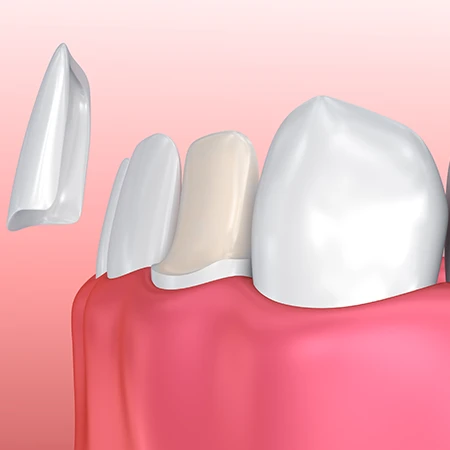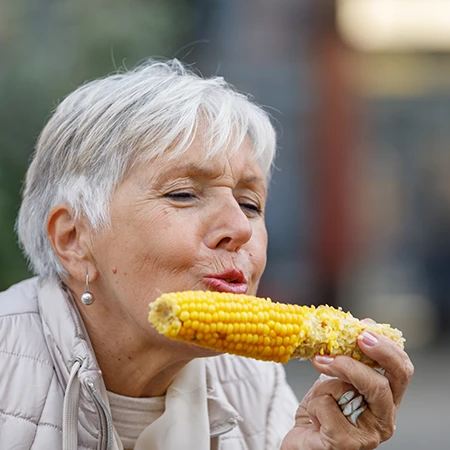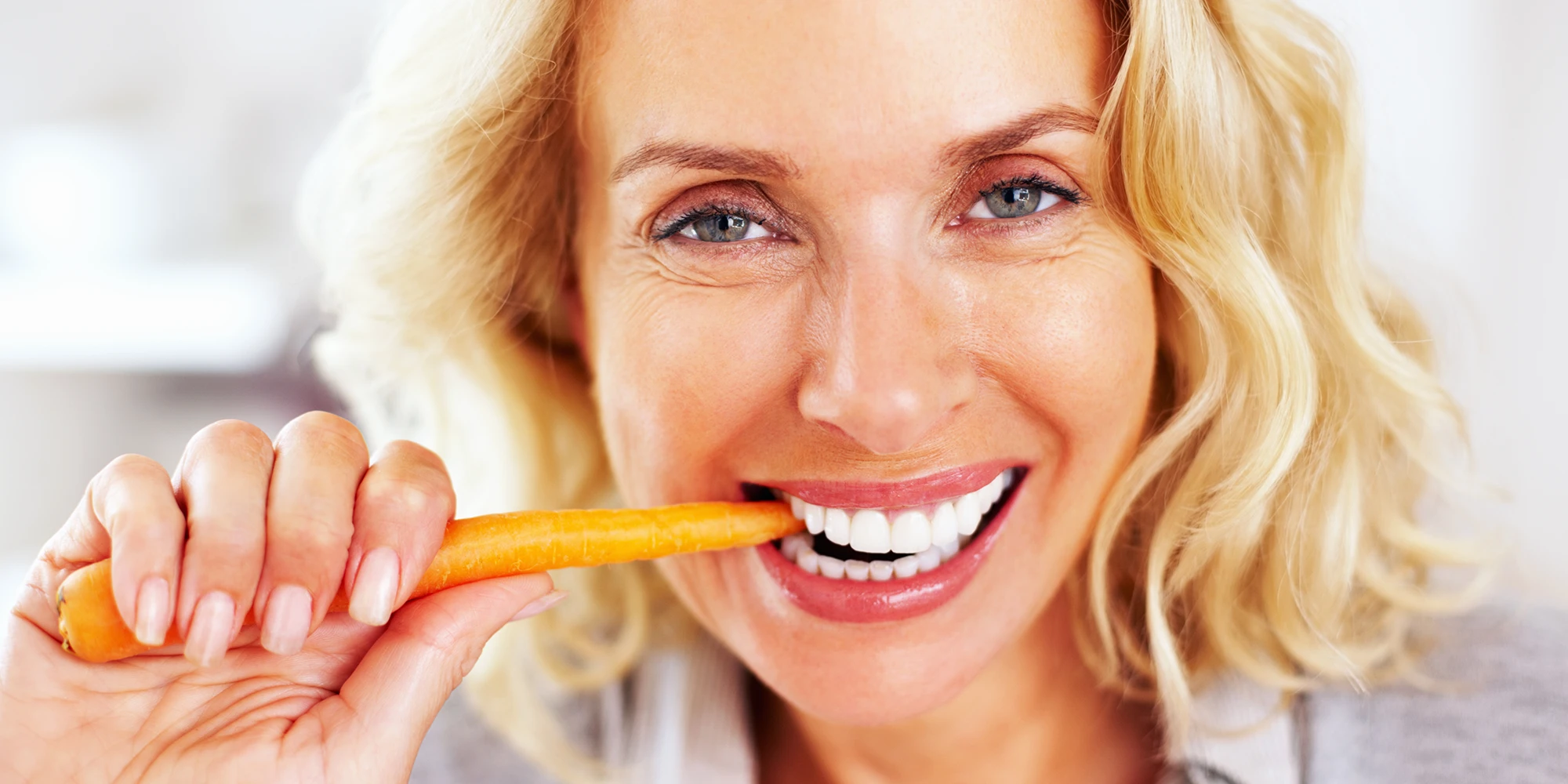Imagine sitting down to enjoy your favorite meal, savoring each bite without hesitation or worry. This is a common desire for many people with dental veneers, prompting the question: Can you eat normally with veneers? It’s a common inquiry among those considering or already wearing these cosmetic dental enhancements.
In this blog, we will see if you can eat with veneers, explore what’s possible, what to avoid, and how to maintain a healthy balance between enjoying your meals and preserving your beautiful smile.
Before delving into the question, Can you eat with Veneers? Let us briefly understand what dental veneers are and how they work.
What are Dental Veneers?
Dental veneers are like thin shells customized to fit your teeth. They’re usually made from materials that match your tooth color, such as porcelain or composite resin. Veneers are placed on the front surface of teeth to enhance their appearance by changing their color, shape, size, or length. This procedure is great for fixing cosmetic dental concerns and can give you a natural-looking smile that lasts.
What are the different types of Veneers?
The different types of Veneers are:
Porcelain Veneers:
These are thin shells made of porcelain custom-designed to fit over the front surface of teeth. They are durable, stain-resistant, and mimic the light-reflecting properties of natural teeth, providing a highly natural appearance.
Composite Veneers:
Created from tooth-colored composite resin, these veneers are directly put and shaped by the dentist during the same visit. While more affordable than porcelain, they may not last as long and are more prone to staining over time.

Lumineers:
A brand of ultra-thin porcelain veneers, Lumineers requires minimal to no tooth preparation, preserving more of your natural tooth structure. They offer a less invasive option for smile enhancement.
Palatal Veneers:
These veneers are designed for the lingual (back) surface of the teeth and are often used for patients with extensive tooth wear or erosion. They provide both functional and aesthetic benefits.
Non-Prep Veneers:
As the name suggests, these veneers require little to no tooth reduction before placement. They are often preferred by patients seeking a reversible option or those with minimal cosmetic changes needed.
What are the Benefits of Dental Veneers?
The benefits of dental veneers are numerous, making them a popular choice for improving smile aesthetics and dental health.
Here are some key advantages of Veneers:
- Enhance tooth color, shape, size, and length.
- Improve overall smile aesthetics.
- Provide stain resistance (for porcelain veneers)
- Strengthen mildly damaged teeth.
Can You Eat with Veneers?
One common concern among individuals is: Can you eat with Veneers? Here’s what you need to know about eating with veneers:

Eating Soft Foods:
Veneers can handle regular chewing forces well, allowing you to enjoy a variety of soft foods without concerns. Examples include pasta, cooked vegetables, yogurt, and soft fruits.
Avoid Excessive Force:
While veneers are durable, it’s essential to avoid biting hard objects such as ice, nuts, hard candies, and pens, which can potentially damage or dislodge veneers. Don’t use your teeth to open packages or bite into non-food items.
Cutting Food:
For harder or tougher foods like apples, carrots, or crusty bread, it’s advisable to cut them into smaller, bite-sized pieces rather than attempting to bite directly into them with the front teeth.
Chewing Properly:
Practicing proper chewing techniques involves distributing food evenly across all teeth rather than focusing excessive pressure on specific teeth or veneers. This habit not only protects veneers but also promotes overall oral health.
Dental Check-ups:
Visit the dentist for regular oral check-ups to assess the condition of veneers and ensure they remain intact and functional. Dentists can detect any signs of wear, damage, or misalignment during routine visits.
Foods to Avoid After Getting Dental Veneers
Here’s what you should avoid after getting Dental Veneers.
- Hard Foods:
Refrain from chewing on hard foods like ice, nuts, and hard candies, as they can chip or damage your veneers. Choose softer alternatives to protect your investment.
- Sticky Foods:
Avoid sticky candies, taffy, and chewing gum, as they can adhere to veneers, leading to dislodgement or stains.
- Staining Foods:
Be cautious with foods and drinks known for staining, such as coffee, tea, red wine, and deeply pigmented fruits like berries. Consuming these items in moderation and practicing good oral hygiene can help maintain veneer color.
- Acidic Foods and Drinks:
Limit acidic foods like citrus fruits and sodas as they can weaken enamel and potentially affect veneer longevity. Rinse your mouth with water after consumption to minimize acid effects.
- Abrasive Toothpaste:
Opt for non-abrasive fluoride toothpaste to prevent scratching the veneer surface. Consider using a soft-bristled toothbrush for gentle cleaning without damaging your veneers.
How to Maintain Veneers for Longevity?
Follow the guidelines given below to maintain the longevity of Veneers.
- Regular Dental Check-ups: Visit the dentist for routine check-ups and cleanings to ensure the health and stability of your veneers.
- Good Oral Hygiene: Brush teeth twice daily with a non-abrasive toothpaste and floss daily to prevent decay and gum disease around veneers.
- Protective Measures: If you engage in teeth grinding (bruxism) or contact sports, wear a mouthguard to protect your veneers from damage.
- Address Issues: If you notice any damage or changes to your veneers, consult your dentist promptly for evaluation and necessary repairs.
Conclusion
Can You Eat with Veneers? Yes, you can eat almost all foods normally with veneers, but it’s essential to be mindful of specific food types and maintain good oral hygiene. Consult your dentist for personalized advice on veneer care.
Ready to get veneers and enhance your smile?
Schedule an appointment at Seattle’s Best Smiles, Kirkland, WA, for personalized care. New patients can call us at 425-363-9864, and current patients can call us at (425) 307-1177 for assistance.
Ready to learn more about the cost of denture stabilization and explore your treatment options? Schedule an appointment with Seattle Best Smile today. Our experienced team will assess your needs and provide personalized recommendations for achieving a confident smile.
FAQ
Can You Eat with Veneers?
A common misconception is that veneers prevent normal eating. However, modern veneers are durable and can withstand regular eating habits. Can You Eat with Veneers? Absolutely, you can enjoy most foods without worrying about damaging them.
Can veneers break while eating hard foods?
Veneers are durable but can chip or crack with excessive force, so avoiding biting hard objects is best.
Do veneers require special eating habits?
While veneers allow you to eat normally, avoiding extremely hard or sticky foods is advisable for their longevity.
Can I brush my teeth normally with veneers?
Yes, use a non-abrasive toothpaste and a soft-bristled toothbrush for gentle cleaning of veneers.




